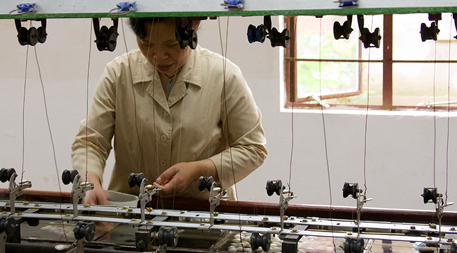

Poor air quality is linked to decreased productivity, school attendance and even lifetime earnings



When the Clean Air Act of 1970 became law, members of the business community in the United States responded with opposition. Such regulations are a drag on growth, some economists say, for individual businesses and for the economy at large.
While it is often expensive to upgrade equipment to reduce pollution, other economists argue such actions should be seen not as a tax but rather an investment in human capital and healthy bottom lines.
“What you’re able to do later is partly determined by the environmental quality we have now,” says Joshua Graff Zivin, professor of economics in the School of Global Policy & Strategy and the Department of Economics at the University of California, San Diego, who has conducted a number of studies on this topic. The grow-now, clean-later approach to economic growth, he contends, is counterproductive.
Graff Zivin is among a small but increasing number of health and economics researchers who are looking at possible ways to measure the value — in economic terms — that cleaner air brings to society. They argue that not only are the costs involved in reducing pollution justified by the public health benefits, but businesses may benefit directly in the form of increased productivity of the employees working for them — and more long-term, from a healthier, more educated and more productive labor force in the future. Mounting studies have suggested that air pollution — sometimes even well within regulatory standards — causes workers to be less productive and possibly have impaired decision-making in both indoor and outdoor settings.
From Field to Desk
When regulatory agencies like the U.S. Environmental Protection Agency establish air quality standards, they are supposed to take into account health and economic assessments that have evaluated how the pollutants being regulated impact human (and environmental) health, and what the economic impacts of the regulation will be, including both costs and benefits. Researchers have been providing evidence in recent years that suggests regulators should look beyond conventional and visible measures like hospitalizations when weighing costs and benefits related to regulatory standards. Studies suggest they should also include data from the growing body of research on the more subtle impacts of air pollutants, such as ozone and particulate matter, on the labor market.

A 2012 study found that as ozone pollution decreased, California farm workers became more productive. Photo © iStockphoto.com | FilippoBacci
Graff Zivin and Matthew Neidell, associate professor of health policy and management at Columbia University, reported in 2012 an association between ozone pollution and productivity among grape and blueberry pickers in California. When ozone exposure decreased by 10 parts per billion — and was at a level well below the federal air quality standard — the workers were 5.5 percent more productive.
Then, in 2014, they and colleagues found that particulate matter, a common air pollutant, also at levels well below the regulatory standard, reduced the hourly earnings of people who packed pears at an indoor facility in northern California and were paid in accordance with how many pears they picked. When levels of fine particulate matter surpassed 25 micrograms per cubic meter(µg/m3) — the EPA standard for a 24-hour period is 35 µg/m3, and for a full year is an average of 12 µg/m3 — workers’ earnings decreased by US$1.88 per hour.
The next question for the research team was: What about desk jobs? Are workers affected if they aren’t doing manual labor?
Workers at two call centers in China were about 5 percent more productive when the outdoor air quality was what the EPA would rate as “good” than when it would have been rated “unhealthy.”Their subsequent study suggests the answer is yes. In 2016, the researchers reported that workers at two call centers in China were about 5 percent more productive when the outdoor air quality was what the EPA would rate as “good” than when it would have been rated “unhealthy.” And while the levels of pollution in the unhealthy air exceed the levels allowed by EPA on a daily basis, they are nonetheless the semi-regular reality in urban areas around the world, including in the U.S. — where regulations allow for spikes above what’s permitted as a long-term average. Citing EPA data, they wrote that Los Angeles, for example, experienced 13 days of “unhealthy” air in 2014, while Phoenix had 33.
To Graff Zivin, these results suggest the effect may be universal. “There’s nothing special about call center work in China,” he says. “We worked on China because that’s where we could get the data. If it matters there, it should matter everywhere.”
Varying Results
That has not been proven, though, and the few studies that have been done on this have yielded varying results. Last September, a research team in Singapore published a study of workers in two different textile manufacturing plants. The team concluded that pollution exposure did reduce the productivity , but only by about 1 percent, and after prolonged exposure.

Air pollution has been linked to lower productivity in Chinese textile workers. Photo courtesy of Daniel Foster
Alberto Salvo, economist at the National University of Singapore and an author of that study, says: “We’re all providing data points. At some point, someone has to come along and do a meta-analysis and tell us what the general run of papers is saying. Because we do see a lot of variation across these studies. I think we’re all contributing to answer a question that is important … about the benefits and costs of environmental regulation.”
Salvo and others are looking at other possible ways to evaluate air pollution impacts that could also have implications for labor and economic productivity.
Last year, researchers reported findings drawn from the early days of the 1970 Clean Air Act, when some counties had to reduce their pollution and others didn’t because of some requirements implemented in 1970. People who were born in the counties that didn’t have to improve their air had lower earnings and labor force participation when they were 30 years old, compared with the cohort of people born in counties that did have to make such improvements.
Maya Rossin-Slater, health research and policy assistant professor at Stanford University and one of the authors of that study, says that just as investments in preschool are generally accepted to pay off later in life, ensuring better environmental quality may be affiliated with higher incomes later in life.
“Exposure to air pollution, not just through the workplace but through other channels, such as during early childhood or the in utero stage, could have lasting long-term consequences on the labor market productivity — the economic productivity of basically the next generation,” says Rossin-Slater. “There’s this intergenerational component that I think is important to recognize.”
Education and Equity
A number of studies look at what air pollution means for education. An unpublished study found an association between air pollution and higher school absences. Another study linked air pollution with slower cognitive development in school. In March, Salvo and his colleague Haoming Liu reported that students at three international schools in China — where wealthy expat families tend to send their children — were slightly more likely to be absent from school when levels of air pollution spiked.
That may have two major implications, Salvo explains: It could impede the international flow of workers if people considering jobs overseas choose not to take them out of concern for their families’ health; and it’s an equity issue, because the absences seemed to be a result of families not wanting their children to be exposed to the air.

Multiple studies suggest that air pollution can affect children’s thinking and learning. Photo © iStockphoto.com | xavierarnau
“These are very high-income families. The parents are very informed. These are parents who are telling their kids to eat their broccoli,” says Salvo. They may know and be able to avoid the air pollution more than kids in lower-income families.
Last year, Sefi Roth, assistant professor of environmental economics at the London School of Economics and Political Science, in an analysis of relevant studies, summarized some possible explanations for why air pollution may affect academic performance and ultimately “human capital formation,” defined as the skills, knowledge and experience accumulated by an individual.
First, the brain uses a lot of oxygen and may get less of it when a person is breathing in polluted air. Second, air pollution also appears to affect the development of the brain itself in young children, although the full range of impacts are not fully understood. Third, individuals experiencing physical symptoms associated with air pollution, from eye irritation to asthma attacks, may simply not function as well or even miss school altogether. Ultimately, these disruptions could alter a person’s entire career path.
Roth also highlights evidence suggesting that air pollution disproportionately affects the educational outcomes of lower-income populations.Roth also highlights evidence suggesting that air pollution disproportionately affects the educational outcomes of lower-income populations — which implies that improving air quality could improve social mobility as well, because low-income families are more likely to live in neighborhoods with more pollution. “Policy-makers should acknowledge these additional effects when formulating new environmental regulations and should revisit existing policies,” he writes.
Impacts on Decision-Making
In January, a study linked higher air pollution with behaviors that are less “prosocial,” a decline the study describes as giving less, cooperating and reciprocating less, and demanding more — which can affect both individual and group decision-making. And in 2016, Neidell and colleagues reported that as fine particulate matter pollution increased in Manhattan, same-day returns on the New York Stock Exchange declined. They suspect that the pollution impairs cognition, changing how people actually think and making them less likely to take risks — which on the stock market means taking safer, and less lucrative, bets.
They looked at pollution in other cities to see if there was a correlation between air pollution elsewhere and the performance of the companies being traded on the stock market, rather than with the investors making trades on those companies — but found no relationship.
“It’s pollution in New York City that matters, and it’s not pollution where the firms are located. It’s pollution where the traders are,” says Neidell.
Most of the studies have been done on either ozone or on particulate matter, largely because they’re both regulated and straightforward to measure. Graff Zivin says the research supports stricter regulations in the U.S. for both — where regulations are already stricter than many other countries — and possibly for other pollutants as well. Revising regulations, he adds, should mean taking into account what have previously been unmeasured and ignored benefits to the economy.
“How much money do businesses spend on training for their employees, on ergonomic design? All those things are meant to improve productivity. This is no different from that,” he says.
The next frontier in this research could be to uncover effects far beyond the workplace, from driving safety to buying a house.Earlier this year, Graff Zivin and Neidell arguedthat this should not be a regulatory issue only for the U.S. Environmental Protection Agency to deal with. Because it affects occupational safety, it should involve other agencies like the Occupational Safety and Health Administration and the equivalent in other countries, as well.
“We’re being very protective of our steel workers and our manufacturing base, and we may be starting a global trade war over it, and yet we’re tearing back regulations left and right, some of which appear to protect and improve the earnings capabilities of those very same workers,” says Graff Zivin.
He suggests the next frontier in this research could be to uncover effects far beyond the workplace, from driving safety to buying a house.
“Any investment decision you might make as an individual, any decision might be corrupted by pollution,” he says. “That’s where the evidence is pointing us.”
We are a voice to you; you have been a support to us. Together we build journalism that is independent, credible and fearless. You can further help us by making a donation. This will mean a lot for our ability to bring you news, perspectives and analysis from the ground so that we can make change together.

Comments are moderated and will be published only after the site moderator’s approval. Please use a genuine email ID and provide your name. Selected comments may also be used in the ‘Letters’ section of the Down To Earth print edition.